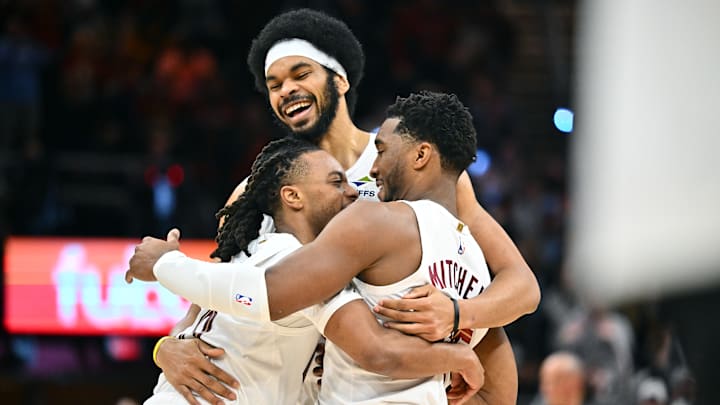Trade rumors constantly follow the Cleveland Cavaliers and the core four without anything materializing, but the new luxury tax penalties may force the Cavs' hand.
Currently, the Cavaliers are one of the highest-cost NBA franchises, skyrocketing the payroll into the newly-formed ominous second apron of the luxury tax. In short, it places heavy restrictions on trades, signings and future drafts for teams above the threshold. The second apron threshold sits at roughly $207 million. The core four's salaries alone combine for nearly $152.2 million, putting the team just below the allotted $154 million cap space with at least 10 more roster spots to fill.
Winning an NBA championship should never feel like a math problem, but the Cavaliers have no choice but to solve one. With just 11 wins in 25 playoff games, the Cavs' costly cap sheet has undeniably diminishing sustainability. The current CBA was built to avoid teams overspending to buy talent and build a super team in free agency, but the Cavaliers may soon be punished for building through the draft and timely trades - the exact way the NBA wants to see.
If the Cavaliers' early 2025-26 regular season returns are subpar, especially with Max Strus' recent injury news, the Eastern Conference contender may angle themselves to creep closer to dropping out of the second apron before the trade deadline passes. Given the price tag of the core four, shopping one of the core players may be a necessity.
Cleveland may have to trade Jarrett Allen to save money
Thus far, the Cavaliers have been steadfast in proclaiming a willingness to pay the luxury tax. President of Basketball Operations Koby Altman has repeatedly stated that owner Dan Gilbert has not placed any restrictions on the team's finances, willingly paying a hefty luxury tax bill. With a vast array of talent already on board, the Cavs do not have to survey the trade market as much as other contending hopefuls, making those restrictions less penalizing.
Still, the future draft pick implications and significant raises in luxury tax payments could force the Cavaliers to rethink staying in the second apron. Injuries are already creeping into Cleveland's rotation, and a poor first half to the season could shift the dynamic from paying whatever is needed to reconfiguring the pay roll.
Jarrett Allen, a constant fixture of the Cavs' frontcourt success, could be the first core player on the move due to the second apron. While Allen is the cheapest of the four, he is also the easiest to move. Owed $20 million this season, trading Allen for a lower-cost player not only saves the Cavs the salary difference this season, but Allen's $8 million pay raise next year is also off Cleveland's list if he is traded.
Starting in the 2026-27 season, Allen's salary will leap to $28 million, giving him a 40-percent increase. If the Cavs need to restructure, dropping $8 million from the future cap table would be an underrated but crucial piece to find a way out of the second apron.
Last year, Allen averaged 13.5 points, 9.7 rebounds and 0.9 blocks in 28 minutes per game. For the first time in his career, he appeared - and started - in all 82 regular season competitions. He was also a starter for all nine postseason games. While Allen has been a consistent presence and a valuable center for the Cavs, last season included his lowest scoring and minutes per game since he joined Cleveland. His usage rate (15.9) was also the lowest as a Cavalier.
In the wake of Evan Mobley's rising stardom, Allen's position with the Cavs is diminishing, but his pay is still set to increase. While the Cavaliers have not indicated any regret in signing that deal, Allen's three other co-stars earned All-Star accolades this year, leaving him as the odd man out. To his credit, Allen has never once complained about his role and seems content as the fourth man in the quartet, ignoring the constant criticism and trade speculation.
Unfortunately, Allen's inspiring professionalism does not change the brutal, and arguably unfair, rules of the CBA. The Cleveland Cavaliers will eventually be forced to shed salary, and if it happens this season, Allen could find himself an untimely victim of the luxury tax.
